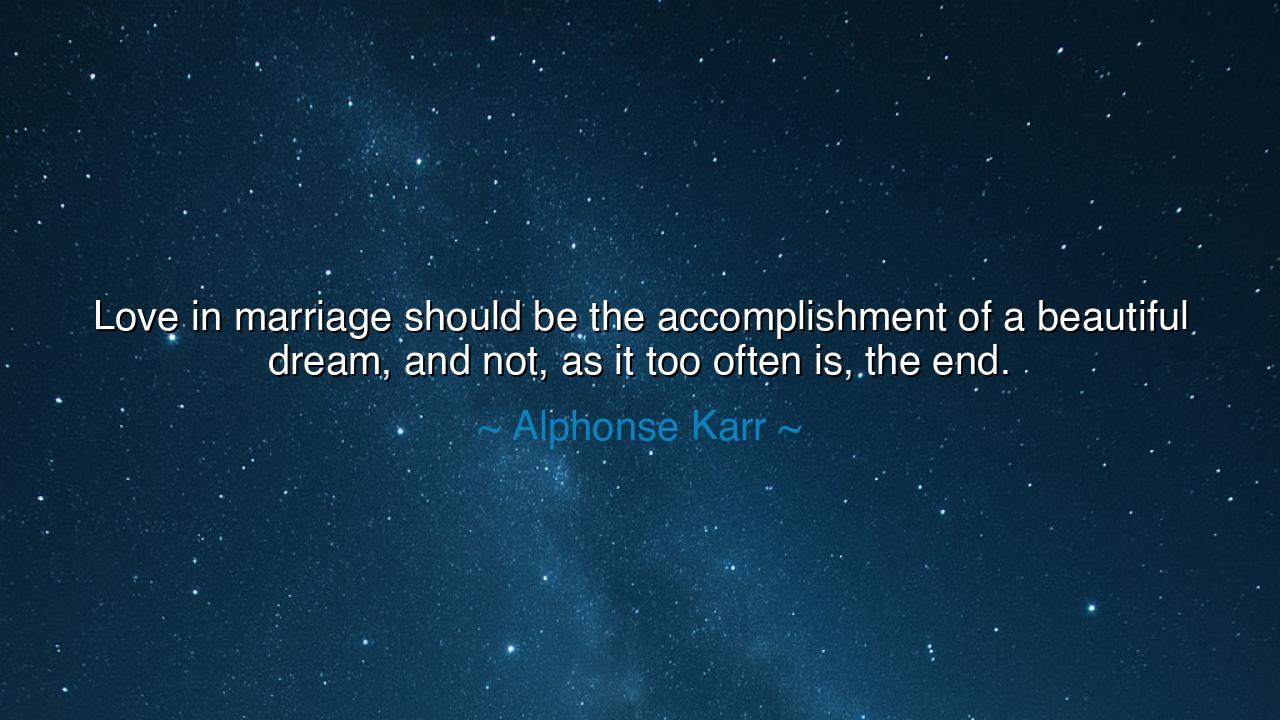
Love in marriage should be the accomplishment of a beautiful
Love in marriage should be the accomplishment of a beautiful dream, and not, as it too often is, the end.






The words of Alphonse Karr, gentle yet piercing, speak like the whisper of truth hidden beneath the noise of romance: “Love in marriage should be the accomplishment of a beautiful dream, and not, as it too often is, the end.”
In this sentence lives both sorrow and hope — the sorrow of hearts that once burned brightly and dimmed, and the hope that love, when nourished rightly, may become the crowning achievement of a life shared, not its fading echo. Karr, the 19th-century French writer known for both wit and tenderness, saw through the glitter of society into the quiet corners of the human heart. His words remind us that marriage is not the destination of love, but its continuation, the sacred ground where the dream must be tended if it is to live.
In his time, as in ours, love was often mistaken for the fever of beginning — the thrill of pursuit, the poetry of longing. But Karr saw the tragedy of such passion: that when vows are spoken and rings exchanged, many treat the dream as fulfilled, the labor as complete. Yet true love, he says, begins after the wedding day. The altar is not an ending, but a threshold. It is there that two souls, once enchanted by illusion, must learn the greater art — to love not the dream of the other, but the truth of them. Only then does love rise from fantasy into enduring grace.
History offers many mirrors for this truth. Consider Queen Victoria and Prince Albert, whose union was born of affection yet forged in discipline. Their love, though tender, was not always gentle — it demanded patience, forgiveness, and humility. When Albert died young, Victoria mourned him not as a lost passion, but as the partner of her life’s purpose. Their marriage was not the end of her dream, but the embodiment of it — a love that continued beyond death, proving that true devotion deepens with time, even as beauty fades and youth departs. Such was Karr’s vision: that love in marriage, when rightly tended, becomes the masterpiece of human affection, not its grave.
The ancients, too, knew this wisdom. The philosopher Plato spoke of love as a ladder, rising from the desire for beauty to the contemplation of the divine. Marriage, in this sense, is the middle rung — the place where passion must ascend into friendship, respect, and shared virtue. To remain only in the lower steps of infatuation is to wither; to climb together toward understanding is to flourish. So when Karr says that marriage should be the accomplishment of a dream, he means that it must be an evolution, not a decline — a work of two souls shaping a common destiny with tenderness and truth.
Too often, love fails because it confuses possession with partnership. The lovers who once sought each other’s gaze begin to look outward — toward ambition, pride, or resentment — and the dream turns to dust. Yet love, like a garden, thrives only when watered by attention. It demands daily care: a word of kindness, a shared silence, a touch that says, “I see you still.” In these small acts lies the continuation of the dream, made real not through grandeur, but through constancy. Love must be lived, not merely remembered.
Let those who hear these words take heed: do not seek marriage as the end of longing, but as the beginning of a deeper art. Love must be renewed with each sunrise; it must adapt as the years unfold. To dream beautifully is easy — but to turn that dream into a life of compassion, laughter, and resilience is the true triumph. This is what Karr calls us toward: the transformation of fleeting passion into enduring peace.
So, my child, when love finds you, do not rush to seize it as a prize, nor let it wither in complacency. Build with it. Tend to it. Speak not only in the poetry of beginnings, but in the humility of persistence. For when marriage becomes not the end of love’s dream, but its fulfillment, then two hearts do more than survive — they become a testament to what humanity, at its best, can achieve: a union where affection becomes wisdom, and where love, no longer fragile, takes its rightful place among the eternal things.






AAdministratorAdministrator
Welcome, honored guests. Please leave a comment, we will respond soon